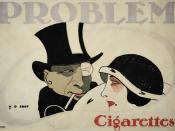In the article "Cigarette Ads: A Matter of Life" Ellen Goodman writes about banning cigarette ads. She states that prohibiting cigarette ads is not the perfect way to stop the millions of active smokers around the United States from using tobacco, but could be a first step towards helping the next young generation stay away from this enslavement. She insists that the idea of forbidding tobacco ads is the more polemic one on the road to limiting or eliminating the use of cigarettes. She develops her thesis saying that banning cigarette ads won't have an effect on banning other products (alcohol, fat, automobiles) because smoking is the only truly destructive one. Moreover, she underlines how inconsistent the message is in the tobacco world. She believes that cigarette ads send a fake message of sophisticated style, and notes specifically the hypocritical situation of those who want to ban the ads on cigarettes are those that let the market continue to sell them; the latter appearing to be the truly immoral one.
After reading the above article I was astonished thinking how ingenuous people can be. I completely disagree with the author's arguments. Looking at my experience, as a smoker and an Italian witness of the censorship on cigarettes ads in my own country, I believe that forbidding those ads has no true outcome or effect on stopping people from smoking.
Despite the fact I understand the concerns of the author, in her article Goodman doesn't present convincing arguments. The opinion that tobacco is the only item that "when used as instructed is destructive" appears to be a superficial judgment and is completely false. We don't know if smoking three or five cigarettes for fifty years is really destructive, we know that people smoke too many cigarettes a day, and this overusing of tobacco can be detrimental. Similarly, drinking a glass of wine everyday we can have some health benefits, but, for example, visiting the "AA" organization we realize how the abuse of alcohol becomes a tragedy for individual families and society. She also states "cigarette are deadly." Looking at the past fifty years when sixty per cent of population used to smoke, if cigarettes were really deadly we would now have a kind of genocide. What do we really know about the genesis and the evolution of cancer? Elementary knowledge is the answer. So, why do we have to criminalize cigarettes for creating that disease? I think that it is the easiest element scientists and doctors use to save their faces. Reading the medical statistics about people dying from cancer, the first consideration is always if those patients smoked. It is not important if they lived a miserable life that produced a lot of stress, if their alimentation was based on terrible food, if they lived close to factories that poisoned the air they breathed, these are normal conditions that we have to accept; cigarettes, on the contrary, are seen like the devil. In addition, analyzing the problem tobacco she states how frustrating it is to pay health bills for diseases created by cigarettes. In this case, the medical statistics always help us to understand how many people die from car crashes, alcoholism or heart attacks caused by red meat and unhealthy eating, and the community also pays for these calamities.
I don't think that banning cigarette ads will stop the use of tobacco in the future, nor will it interrupt the strong chain that binds smokers to those little pieces of paper filled with dry, brown, tobacco leaves. The roots of cigarettes are so deep rooted that their presence is a part, (and probably a dark part) of our modern life. If for a moment I imagined a society without cigarette ads, I can't deny the sight of cigarettes in the hands of people around me. I can't deny going to see a movie where cigarettes exist. I can't deny that cigarettes outside the advertisements and commercials will survive. I come from a country where, in the seventies, the government started its hypocritical campaign against tobacco. It banned cigarette ads in every form; magazines and TV couldn't have advertisements about cigarettes and items for smokers, like lighters and matches, but the number of smokers increased just the same.
The moral campaign behind cigarettes and their disappearance is flawed. Hypothetically speaking, if in ten years the antismoking people will win and the cigarettes will vanish, what will those people do? Will they sit in a clean air restaurant happy and glad for the health of their neighbors or will a new germ begin to grow and invade them again to start a new high moral war? I understand the responsibility that we have to protect the next generation from different dangers, but nonetheless, I feel that even though cigarettes are a kind of poison, nobody can limit my freedom to damage myself. Nicotine is a drug, but at the same time we have so many "innocent' drugs to relieve the dissatisfaction within human beings, like caffeine, anti-depressants and even food, that I don't wonder if tomorrow there will be new enemies to blame and fight.
Tobacco ads represent the freedom of choice. Everyone has to face trouble in life aware of the consequences. Who wants to place limits on my life? The puritan mentality to fight dangerous issues has caused in history big problems, often bigger than the problem itself. The prohibition of alcohol in the thirties is the example that underlines how is almost impossible to extinguish with censorship a product wanted and used by people. Anthropology shows that there are always small or big groups of people trying to forget their miserable condition: they can be found smoking, drinking or eating whatever substances to relieve spiritual or concrete anxieties. If common morality is ashamed to have a deadly product like cigarettes freely sold, I urge it to stop producing and promoting them! However, it's sure that the day after stopping production, the narcotic desire of people will move towards other "deadly " items.





